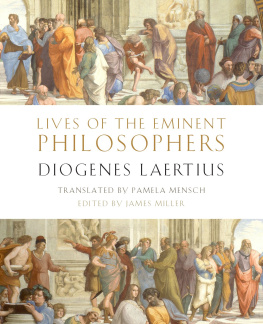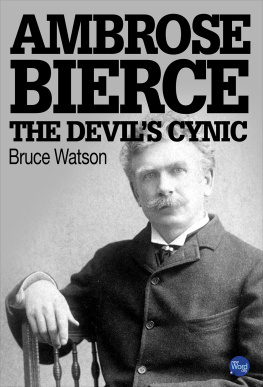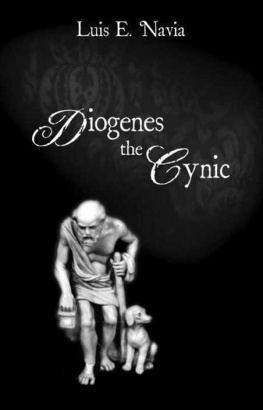OXFORD WORLDS CLASSICS
SAYINGS AND ANECDOTES
DIOGENES (c.404c.323 BC) was born at Sinope on the Black Sea coast as the son of a banker, but later settled in Athens, where he became acquainted with Socratic moral thought, supposedly from Antisthenes, a disciple of Socrates who advocated an ascetic way of life. Taking such ideas to an extreme, Diogenes cast aside whatever he may have owned to live as a beggar in the streets. He thought that we should anticipate the worst that fate can bring by living a life of hardship, and be contented to satisfy our basic needs in the simplest way possible. Casting scorn not only on luxury but on civilized life and culture in general, he tried to shock others into changing their lives by behaving in a provocative and shameless manner, and by subjecting people to his acerbic wit. He thus came to be known as the Dog, and his philosophy and way of life as Cynic, meaning dog-like. Our knowledge of him is derived almost entirely from anecdotes and from sayings ascribed to him. His most notable follower was Crates of Thebes, a man of more conciliatory character who had Zeno, the founder of Stoicism, as one of his pupils. Although Cynicism left its mark on the Stoic movement, it was not widely adopted in its own right until the Roman period, when the Cynic street-preacher would become a familiar figure.
Aristippos of Cyrene (c.435c.360 BC), the disciple of Socrates who became the founder of the Cyrenaic school of philosophy, is known to us mainly through anecdotes as in the case of Diogenes; but his view of life could hardly have been more different, since he thought that happiness is to be sought in the pleasure of the moment, and so introduced a hedonistic strain into the Socratic succession.
ROBIN HARD has translated Apollodorus Library of Greek Mythology and Marcus Aurelius Meditations for Oxford Worlds Classics. He is the author of the Routledge Handbook of Greek Mythology.
OXFORD WORLDS CLASSICS
For over 100 years Oxford Worlds Classics have brought readers closer to the worlds great literature. Now with over 700 titlesfrom the 4,000-year-old myths of Mesopotamia to the twentieth centurys greatest novelsthe series makes available lesser-known as well as celebrated writing.
The pocket-sized hardbacks of the early years contained introductions by Virginia Woolf, T. S. Eliot, Graham Greene, and other literary figures which enriched the experience of reading. Today the series is recognized for its fine scholarship and reliability in texts that span world literature, drama and poetry, religion, philosophy, and politics. Each edition includes perceptive commentary and essential background information to meet the changing needs of readers.
Refer to the to navigate through the material in this Oxford Worlds Classics ebook. Use the asterisks (*) throughout the text to access the hyperlinked Explanatory Notes.
OXFORD WORLDS CLASSICS

DIOGENES THE CYNIC
Sayings and Anecdotes
with Other Popular Moralists

Translated with an Introduction and Notes by
ROBIN HARD


Great Clarendon Street, Oxford OX2 6DP
Oxford University Press is a department of the University of Oxford.
It furthers the Universitys objective of excellence in research, scholarship, and education by publishing worldwide in
Oxford New York
Auckland Cape Town Dar es Salaam Hong Kong Karachi
Kuala Lumpur Madrid Melbourne Mexico City Nairobi
New Delhi Shanghai Taipei Toronto
With offices in
Argentina Austria Brazil Chile Czech Republic France Greece
Guatemala Hungary Italy Japan Poland Portugal Singapore
South Korea Switzerland Thailand Turkey Ukraine Vietnam
Oxford is a registered trade mark of Oxford University Press in the UK and in certain other countries
Published in the United States
by Oxford University Press Inc., New York
Robin Hard 2012
The moral rights of the author have been asserted
Database right Oxford University Press (maker)
First published as an Oxford Worlds Classics paperback 2012
All rights reserved. No part of this publication may be reproduced, stored in a retrieval system, or transmitted, in any form or by any means, without the prior permission in writing of Oxford University Press, or as expressly permitted by law, or under terms agreed with the appropriate reprographics rights organization. Enquiries concerning reproduction outside the scope of the above should be sent to the Rights Department, Oxford University Press, at the address above
You must not circulate this book in any other binding or cover and you must impose this same condition on any acquirer
British Library Cataloguing in Publication Data
Data available
Library of Congress Cataloging in Publication Data
Library of Congress Control Number: 2012930317
Typeset by Cenveo, Bangalore, India
Printed in Great Britain
on acid-free paper by
Clays Ltd, St Ives plc
ISBN 978-0-19-958924-1
1 3 5 7 9 10 8 6 4 2
CONTENTS
INTRODUCTION
DIOGENES the Cynic remains a widely familiar figure, even if very little is remembered about him among people who have no special interest in the ancient world. He is popularly known for having lived in a barrel or tub and for his barbed utterances. But Diogenes was more than a picturesque eccentric, and it is only when such stories are considered in their wider context, as part of the very full surviving record of what Diogenes was supposed to have said and done, that it becomes apparent that he was trying to convey a serious message through his disconcerting behaviour and caustic wit.
Diogenes makeshift home was more accurately a very large ceramic jar, of a kind that was used for storing grain or water. Since he had deliberately chosen to live as a beggar in the streets of Athens, he had no house to return to, and would have taken shelter at night wherever he could, in doorways, temples, or public arcades. It need not be thought that he used a particular jar as his regular home, this is merely one form of shelter that was mentioned among others, even if it became especially memorable for its emblematic value. It is not in fact as highly stressed in ancient sources as one might supposemore emphasis was placed on Diogenes Cynic uniform and accoutrements. To be prepared for any kind of weather, he would wear a rough cloak folded double, which would enable him to keep warm in winter and cool in summer; and since he owned no more than what he could lug around with him, he would carry a knapsack (pera) for his provisions and scanty possessions. Perhaps there was even room in it for a few books and for writing materials.
It was a commonplace of Socratic thought that one can be rich by being satisfied with little, and so achieve a measure of invulnerability to fortune. Diogenes radicalized this idea, taking it to the utmost extreme. If one takes into account only ones most basic needs and desires, putting everything else aside as mere fancy and illusion, and is content to satisfy those needs in the simplest and most direct way possible, one needs hardly anything at all; and if one divests oneself of all that one possesses to live as a vagrant, one can anticipate the very worst and become inured to any hardship, and so achieve complete invulnerability to fortune. Dismissing almost everything that people ).
Next page







